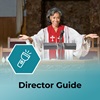North Americans are extremely busy. Recent studies indicate that Americans work the longest hours in the industrialized world. Between 1977 and 1997, the average workweek among salaried Americans lengthened from 43 to 47 hours. Over the same years, the number of workers putting in 50 or more hours a week jumped from 24 to 37 percent. The majority of small group leaders face the same hectic work weeks as their secular counterparts.
One way to relieve tension and provide quality control is to give the small group leader a well-designed lesson based on the pastor's sermon. Let me explain why and then proceed to examine the how.
Why base the small group lesson on the pastor's Sunday sermon?
1. It connects small group with large group (Sunday celebration)
Using lessons based on the Sunday sermon connects the small group with the large group. This practice serves as a constant reminder that the small group isn't an independent entity doing its own thing. The larger purpose and vision of the small group is to build the local church. The expectation is that those in the small group are also part of the larger gathering on Sunday—or at least being evangelized to eventually hook into the celebration service.
2. It applies the expository/teaching message to real 24/7 life
I like a church that has a well-planned preaching schedule and skillfully exegetes God's inerrant Word from the pulpit. Yet, the best churches humbly realize that even excellent sermons are inadequate to completely transform the hearers. George Barna and others are reporting that those inside the U.S. church are not applying what they hear. Statistics demonstrate that North American church goers are not significantly different from those outside the church (e.g., ethics, morals, divorce, pornography, etc.). When a church asks each member to discuss and apply the Sunday message in a small group during the week, there's a far greater chance that transformation, rather than information, will take place.
3. All of the largest small group churches around the world do it
In 1992 I developed a small group ministry in which I asked another person to develop a series of small group lessons that were independent of the Sunday morning sermon. After studying the world's largest small group based churches, however, I noticed that all of them, without exception, based their small group lessons on the pastor's teaching (two of these churches based the small group lesson on the mid-week expository teaching of the pastor, rather than the Sunday sermon). Seeing the positive fruit in these churches convinced me to change.
4. It provides a never ending supply of material
Buying small group lesson material at the local Christian bookstore can be very expensive. And even the best material is bound to run out. When a small group lesson is based on the pastor's teaching, there should be a steady stream of new material—as long as the pastor doesn't repeat the same sermons each week!
5. It relieves pressure from the small group leader
Leading a small group in itself is difficult. There are people to visit, chairs to arrange, leadership development to consider, etc. Add the need to find or prepare the lesson, and the leader might feel overwhelmed. Distributing questions based on the Sunday morning message helps alleviate the leader's workload.
There are Exceptions to Every Rule!!
1. The "free will" exception
Using the Sunday sermon to create the small group lesson should never become a legalistic straightjacket. If the small group leader wants to prepare his or her own lesson, that's great!! My wife, for example, led a small group of young mother's in which she chose to prepare her own material. Even though she received the generic small group lesson each week—and sometimes chose to use it—she normally prepared her own material.
A first-class reporting system should provide information to those in authority about what passage the small group leader is using. And I always think it is wise that the small group leader confer with his or her supervisor/coach about the material being used.
2. The "lacking a celebration service" exception
Some reading this article might be in a new church planting situation in which there is no celebration service—only the small group. Others might be leading a house church in which both small group and large group are combined. In both cases, the lesson would need to be created independently each week and not based on the Sunday morning message.
I am in the process of planting a small group based church in Moreno Valley, CA. We are starting the church with a turbo group (prototype group) in my home. Each member of the initial core group is committed to eventually lead a small group. When we open a number of small groups at once, we will then hold the first celebration service. Since there is no celebration service right now, I am preparing each lesson from scratch.
Important Considerations
1. Who Prepares the Lesson?
There's no one rule here. Often the main pastor will take on this responsibility. If the pastor notices another gifted person, however, he may decide to give his sermon notes to that person who will then prepare the lesson. Perhaps an associate pastor could do it.
In one small group church in Lima, Perú (Living Water Church) a talented leader took diligent notes of the pastor's message in order to weave his thought into the weekly small group lesson. At another small group based church, the senior pastor prepared the weekly lesson. The one constant variable was that each church used the pastor's message as the launching point for the small group topic.
2. How does the lesson get in the hands of the small group leader?
I think it's best if the leader receives a copy of the lesson before the pastor preaches on Sunday morning. One great idea is to place the prepared lesson on the "small group leader's table" (or somewhere in the foyer) so when the small group leader enters the Sunday celebration to hear the Word of God, he or she will first pick up a copy of the small group lesson, knowing that the same lesson will be covered the following week during the small group meeting. In this way, the small group leader can listen to the pastor's Sunday message, while envisioning how that message will apply to his or her small group.
This is not the only way to do it. I visited one small group based church in Australia that placed the small group questions in the Sunday bulletin. These questions were based on the pastor's topic that morning. In this way, the members, as well as the small group leaders, knew what would be covered in the upcoming small group meetings. Other pastors email the lesson to the leaders early in the week.
3. Does the leader have to rigidly follow the exact questions?
The questions are guidelines, not laws. I believe that each small group leader needs to be trained in how to prepare excellent questions in order to reinvent the assigned lesson. The leader might only be able to use one or two worthwhile questions from what he or she receives from the church.
4. What if the leader doesn't use all the questions?
One of the most common errors is including too many discussion questions. Some small group leaders feel obligated to cover all the questions—even if there are 10 or more. The most important consideration is whether or not the people were edified, encouraged, and transformed—not whether or not a set amount of questions were covered.
A good lesson has from three to seven questions. Normally, the small group leader will cover about five questions. My advice is to allow the people to leave with a hunger for more, rather than a commitment never to return to such a long, boring small group meeting. I also think it is important to leave time for prayer after the small group lesson. It is best to reach a crescendo of deep sharing that naturally leads to deep praying.
5. What type of questions are the best?
The best types of questions are observation and application questions. Actually there are three types of questions: observation, interpretation and application.
|
Observation John 3:16:"How did God demonstrate his love for us?" |
|
Interpretation John 3:16: What does the word world mean? Is John talking about the planet? The people on the planet? A worldly system apart from God? Answer: the people on the planet |
| Application John 3:16: "How has God shown His love to me personally?" Answer: Each person in the group would give their own individual answer. |
I suggest a limited use of interpretation questions while frequently using observation and application questions. Normally a great small group lesson will go from observation to application. My general rule is that for every two observation questions, there should be an application question. I have provided two sample lessons that were taken from the Sunday morning message:
| Psalm 90: 1-17: Understanding the shortness of life. 1. Read Psalm 90:9-10. How does the Psalmist describe the condition of man? (observation) |
| 1 Timothy 4:12: Exemplifying Christ-like Behavior 1. Describe in your own words the counsel of Pablo to Timothy in 1 Timothy 4:12. What does the phrase in verse 12 mean, "be an example in life, in love, in faith and in purity?" ( personal observation) |
6. What should be the main focus of the small group?
The aim of the small group lesson is transformation, rather than information. Honest and open sharing in the group should lead to transformation. When a person or couple reveals a struggle, he or she is reaching out for help. "Pray for me." "Help me." The desired result is change. "We want to stop fighting and start understanding each other," the young couple shares. Such deep sharing springs from an earnest desire to change. The goal of the small group is to transform lives, rather than take in knowledge.
Several years ago, I visited a small group that was discussing the parable of the unmerciful servant in Matthew 18:21-35. The small group leader asked question after question about what the text said (observation), then a few more questions about what the text meant (interpretation), but not once did he ask the people to apply these verses to their own lives. He missed a perfect opportunity. He could have said: "Share an experience when you felt bitterness toward another person." He could have followed with: "Share how you overcame those feelings and were able to forgive that person." Most likely there were people that very night who needed freedom from pent-up bitterness and who were longing to share with others.
I counsel small group leaders to make sure they grab the heart during the small group lesson. I tell them not to allow the people to leave the group without having applied the Bible to their own lives. I know of one small group leader who likes to conclude the Word time by saying: "In light of what we have read and discussed in this passage, how do you think God wants to use this in your life or the life of this group?"
Conclusion
There are a number of great ways to prepare small group curriculum. I personally believe the best way is to base the small group lesson on the Sunday sermon. Far more important than the lesson, however, is the transformation that takes place in the lives of the members and then spills over to evangelize a lost and needy world for Jesus Christ.








